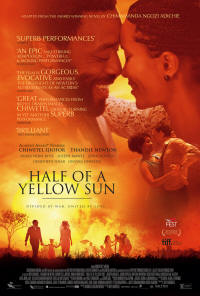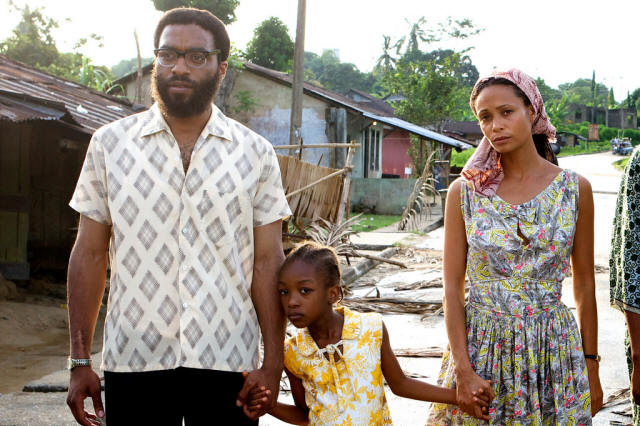Half of a Yellow Sun
Film Reviewed by Kam Williams
Colonial Nigeria Provides Backdrop for Sweeping Romance Saga
 Half of a Yellow Sun
Half of a Yellow Sun
In Theaters: May 16, 2014 Limited
Rated R for violence and sexuality
Running time: 113 minutes
Distributor: Monterey Media
Drama
Directed By: Biyi Bandele
Written By: Chimamanda Ngozi Adichie
Film Review by Kam Williams
Very Good (3 stars)
Twins Kainene (Anika Noni Rose) and Olanna (Thandie Newton) hail from a well-to-do Nigerian family well-enough connected to send them overseas to college where they majored in business and sociology, respectively. Ironically, while the sisters were acquiring a first-rate Western education in England, the independence movement back home was seeking to sever its ties with Great Britain.
After graduating in the early Sixties, they returned to Lagos to launch their careers, only to land in distracting love affairs. Attractive Olanna became the mistress of Odenigbo (Chiwetel Ejiofor), an outspoken college professor who’d caught the anti-colonial fever, whereas willful Kainene entertained the advances of Richard (Joseph Mawle), a white expatriate writing a book about African art.
Sibling rivalry moves Kainene to tease her twin about the philanderer disdainfully referred to as “The Revolutionary.” Nevertheless, Olanna relocates to the bush to be with Odenigbo and his loyal manservant, Ugwu (John Boyega). However, upon subsequently learning that Odenigbo has been unfaithful, she readily rationalizes seducing her sister’s suitor for a one-night stand.

The resulting strain on the siblings’ relationship leads to their drifting apart, a development dwarfed by the bloody, three-year civil war which erupts all around them when Biafra secedes from the union. All of the above elements add fuel to the fires of Half of a Yellow Sun, the highly-anticipated screen version of Chimamanda Ngozi Adichie‘s best-selling novel of the same name.
The film marks the impressive directorial debut of Biyi Bandele, who also adapted the 543-page opus into a 113-minute saga that walks a fine line between romance drama and sprawling epic. That being said, the picture’s examination of the country’s explosive Christian-Muslim tribal tensions proves to be both timely and compelling, given how they’ve recently resurfaced during the radical group Boko Haram’s current reign of terror.
A steamy soap opera unfolding against the backdrop of a cautionary history lesson reminding us that in Nigeria, the more things change, the more they stay insane.

Read More AALBC.com Film Reviews
